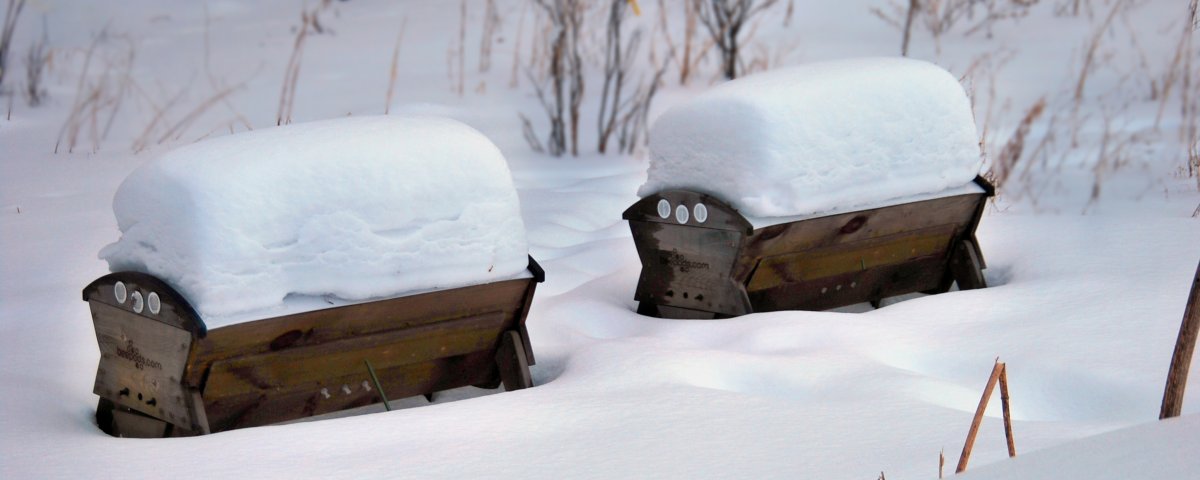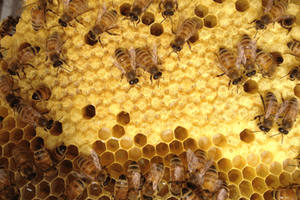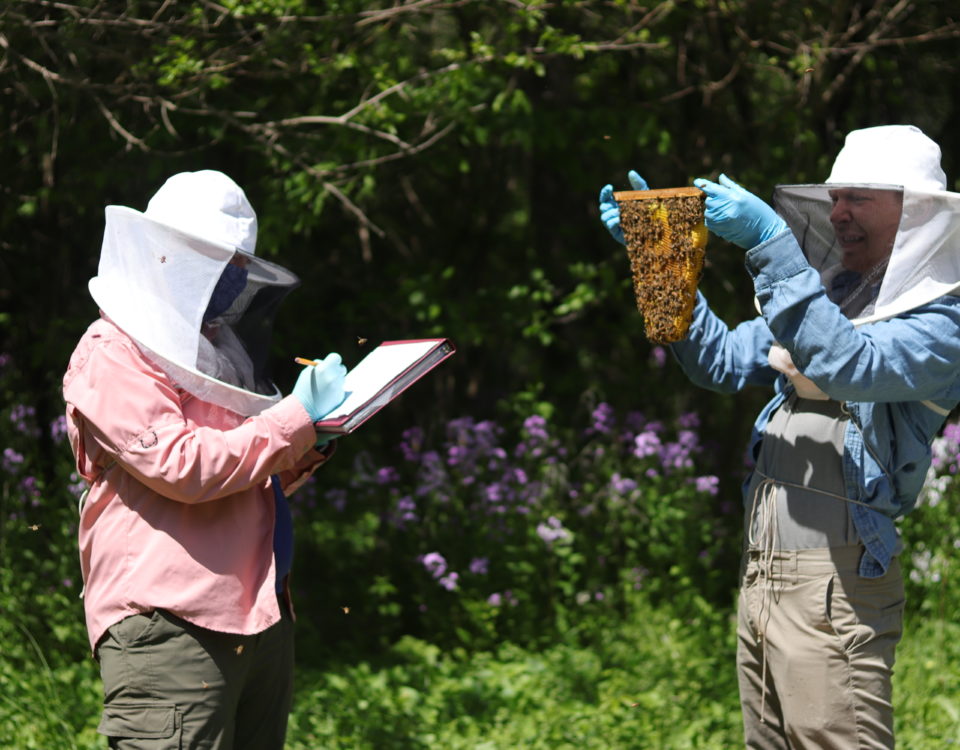- All-In-One Beekeeping for the Bees
- +1-608-728-8233
- info@beepods.com
Why #SnowUsYourBees


#SnowUsYourBees. These Beepods were in one of our old apiaries a few years ago. The snow actually served as a great insulator on top of the moisture resistant lid. These bees survived the snow and winter that year.
Why to #SnowUsYourBees?
Did you know that winter time can be one of the most stressful times for both bees and beekeepers? Did you know that honey bee colonies that endure the harsh climatic elements have a tougher chance of survival? Did you know that over the 2015/2016 year over half of the honey bees that died did so during the winter?
Keeping bees is challenging, especially for those who work hard every year to help honey bee colonies grow and prosper in the harshest of climates. They face the cold, moisture, wind and food shortages in their colonies. Not mention other pests that try to take up residence in their hive as freeloaders. These are just some of the reasons we want to bring awareness about the challenges of overwintering bees. Most people do not keep bees and do not understand what bees do in the “offseason.” For those who are keeping bees, we want to share creative ways that beekeepers, new and old, are preparing their bees for the winter elements. We do not want you to feel alone as the cold hits your face when you go out to listen to your bees.
A significant part of the Beepods Beekeeping Philosophy focuses on preparing bees for every climate. Each climate brings their own challenges. We have taken time over the previous years to test and build new winterizing tactics and maintenance practices that have proven successful in cold winter states. Providing honey bees the best chance of survival in the harshest of winter climates is a priority. Over the 2015/2016 year winter losses measured by the Bee Informed Partnership made up half of the annual loss. The significant winter losses contribute to stresses on the honey bee population. Beyond that, the attitude of beekeepers suffers with each unsuccessful winter. Over the 2015/2016 winter, 28.1% of surveyed honey bee colonies perished during the winter (read more here). This was up 5.8% from the previous year. A 2014/2015 year that was notably harsher than 2015/2016.

Figure 1: Summary of the total overwinter colony losses (October 1 – April 1) of managed honey bee colonies in the United States across nine annual national surveys. The acceptable range is the average percentage of acceptable colony losses declared by the survey participants in each year of the survey.
As Beekeepers, we need to take this information to heart. At Beepods we are. Over the last 4 years, we have tested many applications of winterizing equipment

A BeeRito-wrapped Beepod honey bee colony survived the winter last year. The bees created enough heat to melt the snow all around their home that winter.
and practices that help to ensure higher overwintering success. Our numbers over the 2015/2016 winter were phenomenal. Each of the colonies prepared in the fall with our sustainable preparation and then overwintered with the BEErito and winterizing kit made it through the winter. During the previous 2014/2015 winter season, we had less success, but still maintained higher survival rates than most beekeepers in our areas. This is important if we want to find a sustainable way to improve the abundance of honey bee colonies around the world. You can read more about some ways the Beepods Beekeeping Philosophy and Winterizing Here.
We understand that there are many elements that go into successful overwintering, including some we cannot control. For example, genetics is still new in our world and there is still a lot to learn about bee genetics. We have began to track strains of bees and their pedigree in hopes that over time, we can identify significant attributes that can affect colony outcomes. It is in collecting and reflecting on the data that will create clarity over time.
The Bee Informed partnership has been leading the study on colony losses in previous years and has made great strides in research. Leading the charge in building a network of science based beekeepers and developing studies and solutions that minimize the effects of colony losses each year. We know that not everyone is a scientist, but everyone has a close attachment to their bees. We want to make sure that you do not feel alone as we move through the winter season
Here’s what we are asking you to do:
- Take photos of their beehives/colonies during the winter and post them to your favorite social media.
- Use the hashtag #SnowUsYourBees
- We will share that out to our growing network (many of whom are NewBEEs or interested) to give them an idea of what to expect in winter.
- Every year we do this we want to hear how you are winterizing your colonies. Share, document and let us know what you are doing and if it is successful.
Why?
Data-driven development is important to the future of beekeeping. We want to share what is working over and over again so all beekeepers have successful overwintering. Every Beepods Beekeeping System Tool has gone through testing, data collection, breaking and iterations. We listen to what works and doesn’t work with our customers and clients and we tweak and test it. It is one of the best ways to build something better to save the bees.
Conclusion
If you have questions on how to get involved with us on this project, email us at info@beepods.com. Subject: #SnowUsYourBees. Let us know how you think you can help and let’s talk. I bet we come up with some great ideas to move the beekeeping world forward.
After all, we all are working to BEE the change. Why not work together on it!
Other Great Links About Winter Bees
Nations Beekeepers Lost 44 Percent of Bees in 2015-16 – Bee Informed Partnership Study
Winterizing your hive –> Solomon Paker; Parker Bees
Brad James
Latest posts by Brad James (see all)
- Where does pollinator week come from? A brief History of Pollinator Week and its impact on supporting pollinators - June 17, 2019
- Honey Bee Breeds and Their Attributes - March 2, 2018
- My 3-Year-Old Daughter Loves Bees - December 5, 2017



